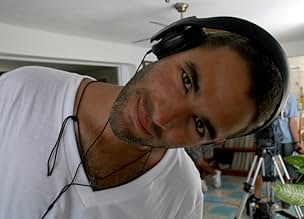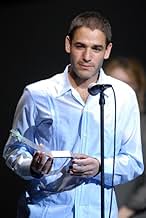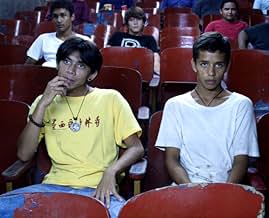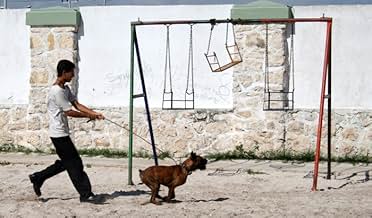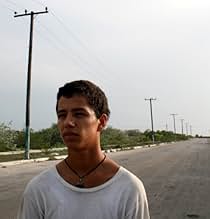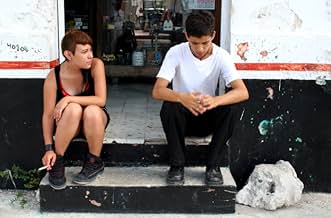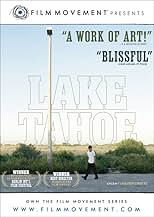Lake Tahoe
- 2008
- Tous publics
- 1h 29m
IMDb RATING
6.6/10
1.8K
YOUR RATING
A story of a teenager and the strange events that take place in his small town.A story of a teenager and the strange events that take place in his small town.A story of a teenager and the strange events that take place in his small town.
- Director
- Writers
- Stars
- Awards
- 10 wins & 9 nominations total
- Director
- Writers
- All cast & crew
- Production, box office & more at IMDbPro
Featured reviews
Seen at the AFI Film Festival in Los Angeles, Lake Tahoe is the director's second feature and follow-up to the acclaimed Duck season which also played at AFI Film Fest.
Again, the director follows the lives of children left alone by adults and left to their own means. The movie opens with a crash of a car and the journey the lead character takes in trying to mend this quaint auto is our incision into his life.
Wide shots are used to create distance. Intimacy is hard to find and long fade to blacks obscure the action in this roman a clef. Curiously short of real drama by the director's choice, it deprives the audience of any real drama.
It plays like a series of vignettes of which include chasing a dog, babysitting a child, a visit to the movie theater and sex; all to show the characters way of dealing with pain. But is is the audience who is really in pain in this slow, boring and ultimately unsatisfying expose on death in a family.
The comedy that was effective in Duck Season pontificates scenes that it should not. The lack of focus in camera set-ups contributes to the blandness. A life time TV movie that is way too long and ultimately insulting because it deceives the viewer that it is up to way more when it really isn't.
Again, the director follows the lives of children left alone by adults and left to their own means. The movie opens with a crash of a car and the journey the lead character takes in trying to mend this quaint auto is our incision into his life.
Wide shots are used to create distance. Intimacy is hard to find and long fade to blacks obscure the action in this roman a clef. Curiously short of real drama by the director's choice, it deprives the audience of any real drama.
It plays like a series of vignettes of which include chasing a dog, babysitting a child, a visit to the movie theater and sex; all to show the characters way of dealing with pain. But is is the audience who is really in pain in this slow, boring and ultimately unsatisfying expose on death in a family.
The comedy that was effective in Duck Season pontificates scenes that it should not. The lack of focus in camera set-ups contributes to the blandness. A life time TV movie that is way too long and ultimately insulting because it deceives the viewer that it is up to way more when it really isn't.
Does anyone know who sings "La lloroncita", the end credits' song ? I loved it but can't seem to find out who sings it
Regarding the movie, i was under the charm of its slowness, the drama increasing gradually to an issue that i definitely found worth the while. I enjoyed these long moments of wait with the characters, i loved that tale of minuscule things. What else ? Lots of humour and weird characters accompany the boy through what can definitely be named a journey of initiation to aspects of life. Lots of emotion and empathy are present here as well.
I heard the director made the movie out of his personal experience. Maybe its truth comes partly from there.
Regarding the movie, i was under the charm of its slowness, the drama increasing gradually to an issue that i definitely found worth the while. I enjoyed these long moments of wait with the characters, i loved that tale of minuscule things. What else ? Lots of humour and weird characters accompany the boy through what can definitely be named a journey of initiation to aspects of life. Lots of emotion and empathy are present here as well.
I heard the director made the movie out of his personal experience. Maybe its truth comes partly from there.
This movie reminds me so much of the Beatles song "A Day in the Life". It's disjoint, existential, seemingly apathetic, and yet it carries a sense of poetry & meaning that's a beauty to behold.
The plot is as simple as it gets: a young man crashes his car and spends the day trying to get it fixed. But the heart of the film is in how it's told. We get a series of fixed camera shots with little or no action except for 1 or 2 characters. It gives the impression of a photo album where the pictures come to life. There's no music. Dialogue is sparse and economical; not a word is wasted. Actors are virtually expressionless through most of the film, but that only adds to the power as we try to decipher what they're feeling beneath their stoic exteriors.
Other directors have used this minimalist approach to varying degrees of success. In this case, I think it's very effective. Despite the long, static, wordless shots, there's a sense of mystery & intrigue that builds up as we are forced to piece together what is happening and, more importantly, what happened before the story. That's what this movie is about--not really what we're watching but the unseen events that led us to this point. It's almost like we're watching a shadow or reflection of a much larger story. If you approach it this way, I guarantee it'll awaken your imagination, and your brain will be lit up like a Christmas tree by the end.
There's not much more I can say about the film except to compare it with other films that have given me the same feeling. Top on the list would be 2001: A SPACE ODYSSEY, the masterpiece of visual storytelling & puzzle-building. Anything by the Japanese master Takeshi Kitano falls into the same category (FIREWORKS, KIKUJIRO, DOLLS, A SCENE AT THE SEA, etc). THE HOLE and THE RIVER by Taiwanese director Ming-liang Tsai are right up this alley. MABOROSI ("Illusory Light") by Hirokazu Koreeda is another film that takes the same approach. And SONGS FROM THE SECOND FLOOR by Swedish director Roy Andersson gives us a similar taste. All of these are excellent, poetic films that use the camera as an objective observer without any flashy gimmicks to lead us. Instead it forces us, the audience, to take in every detail and use our brains a bit.
What sets this film apart from most of the others is that it has a strong sense of humour. Nothing outright lol-worthy, but amusing nonetheless. For example, we see a man and a dog each eating a bowl of Cheerios, perfectly choreographed to finish at the same time. I got a smile out of that & maybe you will too. Other scenes are so awkwardly hilarious (like an auto mechanic who is obsessed with Bruce Lee) that you can't help but chuckle. What makes it so funny is that these are things that probably happen to all of us in our everyday lives, but we never really take notice. This movie gives us the opportunity to scrutinize the strange things that happen to us all, and that's what makes it so intriguing.
I highly recommend it, and you don't even have to be an expert cinephile to appreciate it. If you watch it & like it, go check out the other films I've listed in this review (or if you hate it, be sure to avoid the films I've mentioned!).
The plot is as simple as it gets: a young man crashes his car and spends the day trying to get it fixed. But the heart of the film is in how it's told. We get a series of fixed camera shots with little or no action except for 1 or 2 characters. It gives the impression of a photo album where the pictures come to life. There's no music. Dialogue is sparse and economical; not a word is wasted. Actors are virtually expressionless through most of the film, but that only adds to the power as we try to decipher what they're feeling beneath their stoic exteriors.
Other directors have used this minimalist approach to varying degrees of success. In this case, I think it's very effective. Despite the long, static, wordless shots, there's a sense of mystery & intrigue that builds up as we are forced to piece together what is happening and, more importantly, what happened before the story. That's what this movie is about--not really what we're watching but the unseen events that led us to this point. It's almost like we're watching a shadow or reflection of a much larger story. If you approach it this way, I guarantee it'll awaken your imagination, and your brain will be lit up like a Christmas tree by the end.
There's not much more I can say about the film except to compare it with other films that have given me the same feeling. Top on the list would be 2001: A SPACE ODYSSEY, the masterpiece of visual storytelling & puzzle-building. Anything by the Japanese master Takeshi Kitano falls into the same category (FIREWORKS, KIKUJIRO, DOLLS, A SCENE AT THE SEA, etc). THE HOLE and THE RIVER by Taiwanese director Ming-liang Tsai are right up this alley. MABOROSI ("Illusory Light") by Hirokazu Koreeda is another film that takes the same approach. And SONGS FROM THE SECOND FLOOR by Swedish director Roy Andersson gives us a similar taste. All of these are excellent, poetic films that use the camera as an objective observer without any flashy gimmicks to lead us. Instead it forces us, the audience, to take in every detail and use our brains a bit.
What sets this film apart from most of the others is that it has a strong sense of humour. Nothing outright lol-worthy, but amusing nonetheless. For example, we see a man and a dog each eating a bowl of Cheerios, perfectly choreographed to finish at the same time. I got a smile out of that & maybe you will too. Other scenes are so awkwardly hilarious (like an auto mechanic who is obsessed with Bruce Lee) that you can't help but chuckle. What makes it so funny is that these are things that probably happen to all of us in our everyday lives, but we never really take notice. This movie gives us the opportunity to scrutinize the strange things that happen to us all, and that's what makes it so intriguing.
I highly recommend it, and you don't even have to be an expert cinephile to appreciate it. If you watch it & like it, go check out the other films I've listed in this review (or if you hate it, be sure to avoid the films I've mentioned!).
"Lake Tahoe" is a wonderful, placid drama about a boy's strange encounters as he, externally, seeks help to fix his car, but, more to the point, as he internally seeks something (to escape, to cope, to get reassurance) after the death of his father. He seems willing to befriend the people he meets as long as he chooses the terms himself, and as long as performing favors or going out with friends gets him away from home or anything that would tie him to his town. Don't expect action in this little personal odyssey (taking place over the course of a single day). The viewer gets a chance to focus as intensely on the day's weird experiences as Juan (a teenager experiencing his father's death) does. Even if only for as long as Juan searches for answers.
Fernando Eimbcke's film is shot and takes place in Puerto Progreso, Yucatán (Mexico), a mostly vacant, small town. Juan (Diego Cataño) meets a couple auto mechanics and a clueless auto receptionist, and checks in with his little brother and his grieving mother (she's locked herself in a bathroom for much of the movie). The viewers mainly see him walk across the screen for several long shots, some of which recur as he retreads his path this way and that way.
Nearly every scene is shot with motionless camera angles, a huge difference from many movies in which the camera constantly moves, zooms, or shakes to the point of nausea. The effect of this odd camera work is to make the whole background become part of the film. Patient viewers may get absorbed in the movie, especially as all the individual shots start adding up to a meaningful story. Most of the eventful action takes place off camera, during frequent cut to blacks (sometimes with important sounds in the background, plain natural-musical sounds, or silence). The film has a sense of immersion and simplicity in which the viewer fills the missing fragments with sound or their imagination.
We aren't given much information about where he wants to go or where he was going when he crashed his family's car into a pole (on the side of a low traffic road). How did he crash it in such a seemingly straight and hazard-less area? The point is probably that Juan is just as uncertain as the viewer. He has no ready explanation for the car crash, but perhaps he was trying to get away or somehow escape his intense feelings after his loss. We only learn about any of these feelings until a good way into the movie.
He seems mostly passive at first, just taking in the oddly tangential actions of the people he meets, but he intermittently prods them to hurry. Juan seems stuck between a desire to get out of these places he visits (to always find another auto mechanic) and a strange fixation on experiencing the little quirks of the people he meets. His motive to get away usually wins.
Juan often says "no" or shakes his head in the negative to requests. Juan meets an elderly auto mechanic, Don Heber (played by Hector Herrera), who makes the boy wait as he eats breakfast with his dog, Sica. He goes on to the next person after Don fails to help him fix his car. Juan waits even longer for a young mechanic, David (Juan Carlos Lara II), an energetic follower of martial arts who is apt to break into a series of kicks and arm movements (turning martial arts moves into a sort of dance) and Bruce Lee reenactments. As he hangs out with Lucia (Daniela Valentine), the receptionist at David's auto shop, she starts to trust him and asks him to babysit her infant while she goes to a concert. He declines several times.
Many such encounters play out. David's mother wants him to comment on a passage from the Bible (he sneaks out of the house), Don wants him to walk his dog (Juan accepts only very reluctantly, loses the dog, and then childishly goes on to the next auto mechanic), and David wants him to go to a Bruce Lee movie (he declines at first).
He only accepts any of these offers after he has time to think them over and make his own choice, or perhaps only after he gets home and finds he wants to get away again (perhaps it has to do with the place reminding him of his father). And then these requests for favors and friendship suddenly become the perfect thing to go do.
An excellent, climactic scene takes place between Jaun and Lucia after she isn't able to go to a concert. Jaun doesn't need to stay on as a babysitter and seems intent to leave, but, again, he seems needy at the same time. Lucia takes advantage of his indecision with a sexual advance (they take off their shirts), but he uses it as a cathartic chance for release and ends up crying on her. Probably not what she had in mind, but a very well done scene in minimal, natural light. The rest of the film is also shot with just natural lighting.
Juan is an interesting case study in loss (partly autobiographical by the director) in that it leaves Juan's motives mysterious for the viewer to figure out. Juan tries to escape from everything that holds him in place. But he overcomes such desires in a rush of emotional release. The film leaves me with the feeling that the journey was much more interesting than any likely consequence to it. The post emotional release period sort of kills all the meaningful possibilities and mysterious encounters that took place for most of the film.
Fernando Eimbcke's film is shot and takes place in Puerto Progreso, Yucatán (Mexico), a mostly vacant, small town. Juan (Diego Cataño) meets a couple auto mechanics and a clueless auto receptionist, and checks in with his little brother and his grieving mother (she's locked herself in a bathroom for much of the movie). The viewers mainly see him walk across the screen for several long shots, some of which recur as he retreads his path this way and that way.
Nearly every scene is shot with motionless camera angles, a huge difference from many movies in which the camera constantly moves, zooms, or shakes to the point of nausea. The effect of this odd camera work is to make the whole background become part of the film. Patient viewers may get absorbed in the movie, especially as all the individual shots start adding up to a meaningful story. Most of the eventful action takes place off camera, during frequent cut to blacks (sometimes with important sounds in the background, plain natural-musical sounds, or silence). The film has a sense of immersion and simplicity in which the viewer fills the missing fragments with sound or their imagination.
We aren't given much information about where he wants to go or where he was going when he crashed his family's car into a pole (on the side of a low traffic road). How did he crash it in such a seemingly straight and hazard-less area? The point is probably that Juan is just as uncertain as the viewer. He has no ready explanation for the car crash, but perhaps he was trying to get away or somehow escape his intense feelings after his loss. We only learn about any of these feelings until a good way into the movie.
He seems mostly passive at first, just taking in the oddly tangential actions of the people he meets, but he intermittently prods them to hurry. Juan seems stuck between a desire to get out of these places he visits (to always find another auto mechanic) and a strange fixation on experiencing the little quirks of the people he meets. His motive to get away usually wins.
Juan often says "no" or shakes his head in the negative to requests. Juan meets an elderly auto mechanic, Don Heber (played by Hector Herrera), who makes the boy wait as he eats breakfast with his dog, Sica. He goes on to the next person after Don fails to help him fix his car. Juan waits even longer for a young mechanic, David (Juan Carlos Lara II), an energetic follower of martial arts who is apt to break into a series of kicks and arm movements (turning martial arts moves into a sort of dance) and Bruce Lee reenactments. As he hangs out with Lucia (Daniela Valentine), the receptionist at David's auto shop, she starts to trust him and asks him to babysit her infant while she goes to a concert. He declines several times.
Many such encounters play out. David's mother wants him to comment on a passage from the Bible (he sneaks out of the house), Don wants him to walk his dog (Juan accepts only very reluctantly, loses the dog, and then childishly goes on to the next auto mechanic), and David wants him to go to a Bruce Lee movie (he declines at first).
He only accepts any of these offers after he has time to think them over and make his own choice, or perhaps only after he gets home and finds he wants to get away again (perhaps it has to do with the place reminding him of his father). And then these requests for favors and friendship suddenly become the perfect thing to go do.
An excellent, climactic scene takes place between Jaun and Lucia after she isn't able to go to a concert. Jaun doesn't need to stay on as a babysitter and seems intent to leave, but, again, he seems needy at the same time. Lucia takes advantage of his indecision with a sexual advance (they take off their shirts), but he uses it as a cathartic chance for release and ends up crying on her. Probably not what she had in mind, but a very well done scene in minimal, natural light. The rest of the film is also shot with just natural lighting.
Juan is an interesting case study in loss (partly autobiographical by the director) in that it leaves Juan's motives mysterious for the viewer to figure out. Juan tries to escape from everything that holds him in place. But he overcomes such desires in a rush of emotional release. The film leaves me with the feeling that the journey was much more interesting than any likely consequence to it. The post emotional release period sort of kills all the meaningful possibilities and mysterious encounters that took place for most of the film.
Teen Juan (Diego Cataño) crashes the family car into a pole. He searches the quiet streets for help to fix the car. He encounters paranoid mechanic Don Heber and his dog. Then there is young mother Lucia. And there is David the young mechanic who is obsessed with kung fu.
This is extremely slow and minimalist. It is a Mexican indie. It's visually bright like a sleepy summer day. I'm fine with some long artistic shots but this has way too much of them. The movie is only an hour and a half. It feels like half of it has nothing in it. The other half has very quiet acting going on which doesn't showcase any big acting skills. It is an art film to be sure. I just never felt any excitement for this movie even when the backstory is revealed.
This is extremely slow and minimalist. It is a Mexican indie. It's visually bright like a sleepy summer day. I'm fine with some long artistic shots but this has way too much of them. The movie is only an hour and a half. It feels like half of it has nothing in it. The other half has very quiet acting going on which doesn't showcase any big acting skills. It is an art film to be sure. I just never felt any excitement for this movie even when the backstory is revealed.
Details
Box office
- Gross worldwide
- $219,244
- Runtime1 hour 29 minutes
- Color
- Aspect ratio
- 2.35 : 1
Contribute to this page
Suggest an edit or add missing content



